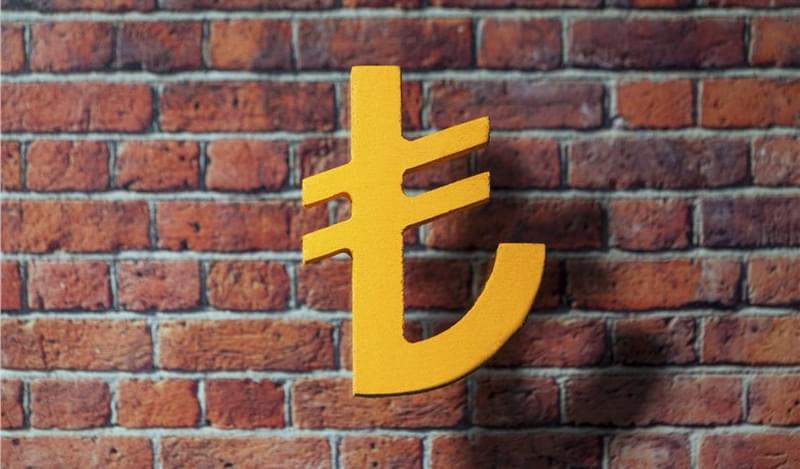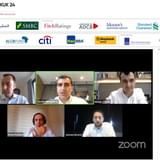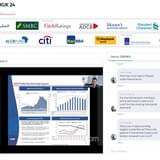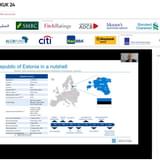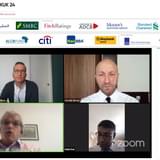The 1.8% negative growth in Turkey’s economy in third quarter of 2016 – the first contraction since 2009 – sent an ominous signal to investors that the macroeconomic problems, namely the falling lira and rising corporate debt, are beginning to take a toll on the country’s economy.
The Turkish currency lost 9% of its value against the dollar since the election of Donald Trump, and 15% since the beginning of September. The net depreciation in this fiscal year reached 20%. The drop is impacting Turkey’s capital markets, with the yield on two-year benchmark bonds rising to 11.1% from 10.94%.
The traditional response to a sliding currency is to hike rates, which the Central Bank has done in November when it raised the benchmark by 50bp to 8%, after keeping it steady since February 2015. That decision went against Erdogan’s directives, as he continued to pressure the Central Bank and the country’s institutions into easing, going as far as to equate failure to do so with ‘treason’.
“I have nothing to say against the central bank’s autonomy,” the Turkish leader told the press recently. “But I will not consent to having my people’s rights and resources wasted through high real interest rates.”
The president also appealed to the Turkish people to keep their savings in lira or buy gold, in an effort to slow the currency’s fall, while the government is considering measures to allow trade with China, Russia and Iran to be conducted in local currencies.
So far, though, his plea has been met with indifference, with a brief three-day lira rally last week being effectively cancelled out by the continued drop this week.
“I am pretty downbeat about on the outlook for both, the currency and the economy next year,” said William Jackson of Capital Economics. “Things appear to have improved and confidence has recovered lately, but I think there are still some significant vulnerabilities and growth will be quite week.”
According to the economist, Turkey’s heavy dependence on foreign capital has manifested in a large current account deficit, and, with three or four Fed rate hikes expected next year, the external financing conditions are going to tighten, which will keep the lira under pressure.
“We see it dropping to 3.75 per dollar by the end of next year,” Jackson stated, adding that Capital Economics is expecting modest GDP growth at around 2% or lower.
The devaluation is putting a squeeze on corporate borrowers and making foreign investors – the key source of the country’s economic growth in recent years – weary. According to official data from the Treasury, foreign direct investment fell 68% in the first seven months of 2016 to US$2.5bn, a significant decline from US$7.5bn in 2015. Jackson gives two reasons for the bleak investment outlook through 2017.
“Firstly, we see the Central Bank tightening monetary policy next year, so credit conditions will become less favourable. Secondly, for corporates, refinancing FX debt is going to become more costly, which will impact lending. So we expect private sector investment to stay quite subdued.”
In September, non-financial companies’ foreign currency borrowings from local banks rose to an all-time high of US$148.7bn – 53% of the total – but we have also seen a worrying rise in non-performing loans.
NPLs jumped to 3.34% at the end of October, from 3.01% a year earlier, while stressed loans – where borrowers delay payment for up to 90 days – surged in recent months as the currency declined. Some lenders, such as Akbank and Turk Ekonomi Bankasi, have been reporting a 30% jump in NPLs in the previous quarter alone.
“Non-performing loans will probably only increase moderately, due to slow portfolio seasoning, a still growing economy and regulatory forbearance,” Fitch stated in a recent report on Turkey. “However, restructured, performing ‘watch’ loans will likely continue to rise and single-name concentration could bring volatility to NPL ratios.”
Overall, the agency predicts a decline in asset-quality in 2017 due to high foreign-currency and SME lending, further depreciation of the Turkish lira and exposure to troubled sectors, such as tourism, energy.
Jackson agrees, pointing to the rise in the so called “stress loans”, which have a heightened chance of becoming NPLs.
“While NPLs have risen, it is worth noting that the current level is still low. But we are still concerned about vulnerabilities in the banking sector – I do wonder about how the official figures reflect the true extent of the problem. I suspect that, in the current economic downturn, corporates with FX liabilities will have more difficulty refinancing debt,” the economist said.
There have been suggestions recently that the government will introduce measures to limit the amount of FX debt companies can accumulate.
“We may have to limit excessive risk taking in foreign currency by the companies,” said the Deputy Prime Minister Mehmet Simsek in a press-conference. “The measures may include making it harder for companies without foreign-currency income to borrow in foreign currency. We are also working on better management of short positions.”
State interference has not been limited to monetary policy: the crackdown on the opposition worsened after the coup, with dozens of companies and businesses, whose workers were accused of plotting against Erdogan, effectively taken over by the government. These purges have even reached the Capital Markets Board, which has been barred from voting on debt and capital issuances for more than two months until the government installs new board members.
This further reduced the appetite of foreign investors, with foreign refinancing facilities displaying the slowest pace of growth since January 2013 and declining lender participation on syndicated deals.
More political instability is expected next year with the presidential election and the referendum coming up. The impact of these votes on the financial and economic condition of the country is difficult to predict.
“While the growing authoritarianism and increasingly unpredictable policymaking chip away at the business and investment environment, I don’t think that a “Yes” vote referendum will necessarily have an immediate impact – I think it is a medium-term worry, 5-10 year horizon,” Jackson noted.
“However, the impact might be stronger on financial markets. That said, after the attempted coup last summer we saw the lira fall, followed by sell-offs in stocks and equities, but that turned out to be short-lived,” he added.
All these factors lead analysts to conclude that borrowing will be limited next year, with little activity is expected to be seen in the credit markets, particularly from the corporate side.
“With the Fed hike, Treasury yields are going to rise, making it more costly to borrow on international markets. So I expect both the sovereign and the corporates in Turkey to be reluctant to borrow unless they absolutely have to,” Jackson said.
Fitch is slightly more positive, reporting that short-term foreign-currency wholesale funding in the corporate sector remains high, despite some efforts to extend funding tenors.
“Issuers in the investment-grade category have access to both domestic and international banks and bond markets and they benefit from cash positions sufficient to cover their short-term obligations.”
However, external risks such as geopolitical tensions or further tightening by the Fed could see funding costs rise, and investor demand along with rollover rates weaken. With those risks in mind, along with the upcoming votes, the tumultuous period for Turkey’s economy looks likely to stretch well into 2017.
